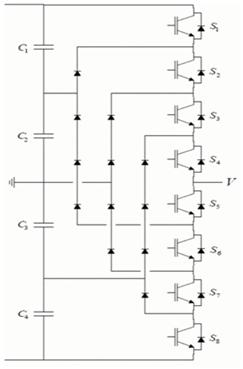I want to use a five-level inverter as an excitation source for magnetostrictive detection,which should be able to output a 100kHz sinwave. I learned that only if the output impendence of the source is equal to the load, can this source get maximize power transfer. As this works on magnetostrictive detection, the load type can be consider as an inductance.So I wonder maybe an impendence matching network is necessay.
In the post below, I introduced my inverter in detail.
Diode-clamped five-level inverter simulation with PSpice
Here is how the inverter looks like.
To design a matching network, I should firstly calculate the equivalent output impedance of the inverter. But I don't know much about deriving equivalent impemdance of a five-level inverter.
Does anyone can help me about that? Thanks a lot.

